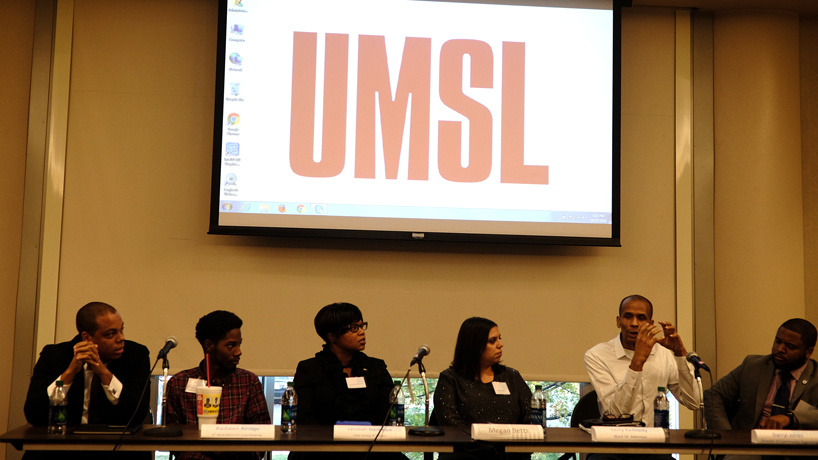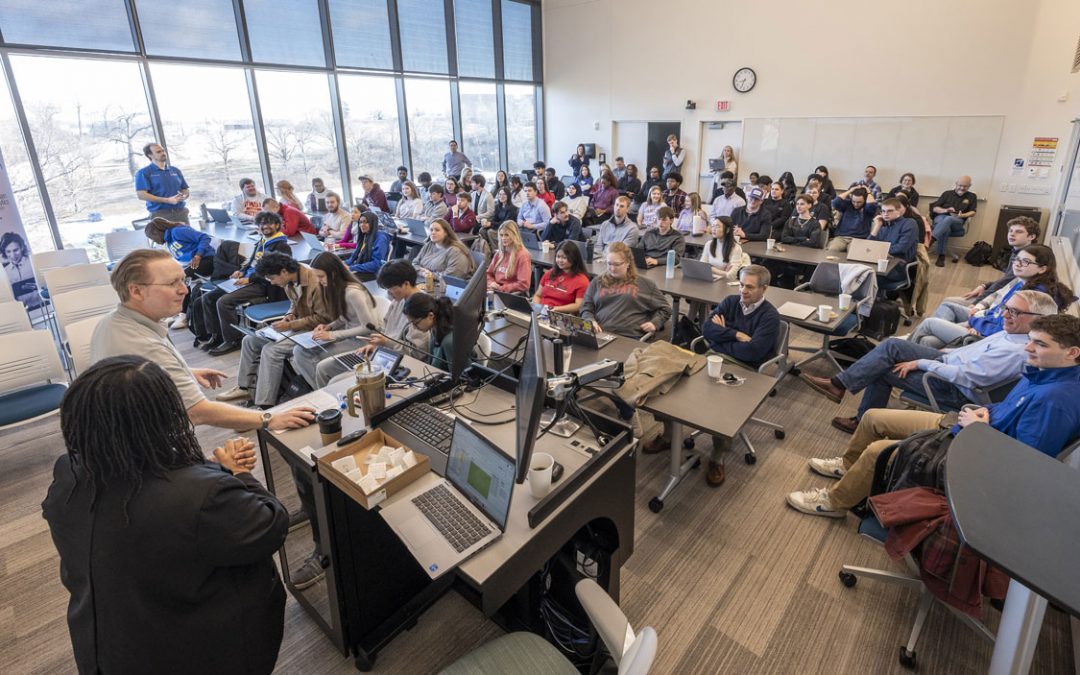
Local politicians listen as 18th Ward Alderman Terry Kennedy (second from right) makes a point during Tuesday night’s “ABC & Politics” event at the Millennium Student Center. (Photo by Steve Walentik)
The battle between Hillary Clinton and Donald Trump to become the 45th president of the United States has consumed network and cable television newscasts as well as the pages of newspapers, magazines and websites for months, effectively blocking out just about everything else that will be on the ballot this fall.
That’s hardly unusual.
But an event put on by the Associated Black Collegians at the University of Missouri–St. Louis Tuesday evening aimed to change that with discussion of some of the state and local issues being brought to a vote on Nov. 8.
“We felt like this would be a great way to educate our members or inform them and let them know the importance of voting and why their vote counts,” said sophomore criminology and criminal justice major T’Keyah Blockton, ABC’s Student Government Association representative, who helped organize Tuesday’s event in the Century Rooms of the Millennium Student Center.
“ABC & Politics” – held for the third straight year – brought together a panel featuring state Rep. Michael Butler; Rasheen Aldridge, candidate for Fifth Ward Democratic Committeeman; state Sen. Jamilah Nasheed; Megan Betts, candidate for Fifth Ward Alderwoman; 18th Ward Alderman Terry Kennedy; and Darryl Jones, the director of community organizing for the Urban League of Metropolitan St. Louis.
In a discussion moderated by ABC member Nakia Brandon that covered two hours, they shared insight and opinions on proposed changes to the Missouri Constitution brought by ballot initiatives, including Amendment 3 and Amendment 4.
The former, a proposed amendment that would increase the state’s tobacco tax by 60 cents, has been controversial and also has been met with some confusion because it’s joined on the ballot by Proposition A, a 23-cent increase to the tobacco tax.
Both measures have been opposed by the American Cancer Society Cancer Action Network, among other groups. The proposition has the support of discount cigarette makers which have enjoyed a price advantage over Big Tobacco companies, who are paying damages for a past that saw them market to children and downplay the ills of smoking. Big Tobacco is supporting Amendment 3 it seems because of a belief it would make the market more equitable.
Nasheed made an argument in favor of Amendment 3.
“We have an opportunity to increase the funding for early childhood education – something which Republicans and Democrats have not done for the last two decades with the educational funding,” she said. “So I think it’s the right thing to do. I don’t think it’s a spook behind the door.”
“You do have a fight between big tobacco and little tobacco,” she added. “But I say when you have a fight between Little Tobacco and Big Tobacco and we can benefit from it in terms of increasing the dollars for early childhood, so be it. Let them fight it out.”
Amendment 4 proposes to amend the state constitution to prohibit new state and local sales/use taxes for any service or transaction that wasn’t subject to similar taxes as of Jan. 1, 2015.
Butler pointed to concerns about dwindling state finances while arguing against the measure.
“This same provision doesn’t allow you to raise taxes, but it does allow for folks to continue to lower taxes and remove funds that could be used for the greater good, like for early childhood education,” he said. “I think if we’re counting on the vote of people to raise taxes, maybe we should include the vote of the people to lower taxes as well.”
“We’ve already cut taxes and reduced revenue so much in the past 10 years,” he added. “I generally say back in the ’90s, you’d see Missouri’s state budget expanding. It’d be like a cow. We have starved that cow to where it’s like a skinny pig. In a sense, this amendment could continue the trend of lowering taxes and lowering the amount of revenue that we can use for government programs and public programs that’s already occurred.”
That sparked a dialogue on what panelists saw as the importance of taxes, particularly for disadvantaged communities.
“Typically, you start rolling back taxes, the first thing that gets cut are those services that are the communities that are the poorest,” Kennedy said. “Those communities also don’t want to be overtaxed, and but you can cut so much that the programs that need just to be able to survive – not to be on par with everybody else, just to survive – are cut also.”
Some of the most impassioned discussion came when talk turned to Amendment 6, which would change the constitution to require voters to present photo ID issued by the state, federal government or U.S. military. Those backing the measure see it as a way to curtail voting fraud, though panelists at Tuesday’s event were unanimous in their opposition to it because they believe such a law would make it more difficult for poor people and the elderly to vote.
“We don’t have a problem, as you all know, with voter impersonation,” Nasheed said. “It’s not like little Mikey is going and voting twice.
“It’s not even about voter impersonation. I think what we are missing the mark on as a collective, both Democrats and Republicans, is voter participation because we have a very, very serious problem with voter participation. In any given ward, you have 8,000 registered voters, approximately. You would get in any given election 2,000 at the most.”
That brought the conversation back to one of the night’s first topics, which was the importance of voting.
More than one member of the panel pointed to the historical struggle to gain access to voting rights by African Americans and women, but that wasn’t the only reason they cited.
“Voting to me is an act of power,” Kennedy said. “Power is your capacity to be able to get something done, and so to me it is the adult thing to do because adults have power in who make decisions. We can keep ourselves in a somewhat juvenile situation and allow other people to make decisions for us, or we can do the adult thing and exercise power to make determinations on what happens in our block, who represents us and what agenda should they carry.”















